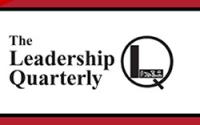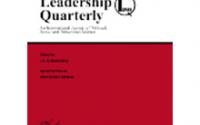-
Share
Despite a growing importance and understanding of emotions and affective processes in leadership, the specific role of positive and negative e...
-
Share
Extending prior research on idiosyncratic deals (i-deals), in the current study we examine the functioning of i-deals in the context of leader...
-
Share
By applying the supplies-values (S-V) fit approach from the complementary person-environment (P-E) fit literature to the leader-employee persp...
-
Share
Although there has been an increased interest in implicit leadership theories (ILTs) over the last two decades, only a handful of studies have...
-
Share
Drawing on social exchange processes in leader-member exchange (LMX), we posit that expressive relational schema (ERS) and instrumental relati...
-
Share
It is well accepted that leadership-relevant constructs (e.g., leader support, family supportive supervisor behaviors) are advantageous for su...
-
Share
Although a great deal of research explores the ramifications of leader–member exchange (LMX) quality for the well-being of followers, leader w...
-
Share
As leaders differentiate between their subordinates at work, subordinates vary in how much they can acquire from their leaders....
-
Share
Abusive supervision is a dysfunctional leadership behavior that adversely affects its targets and the organization as a whole....
-
Share
Although research on servant leadership has been expanding over the past several years, a concise, valid scale for assessing global servant le...

